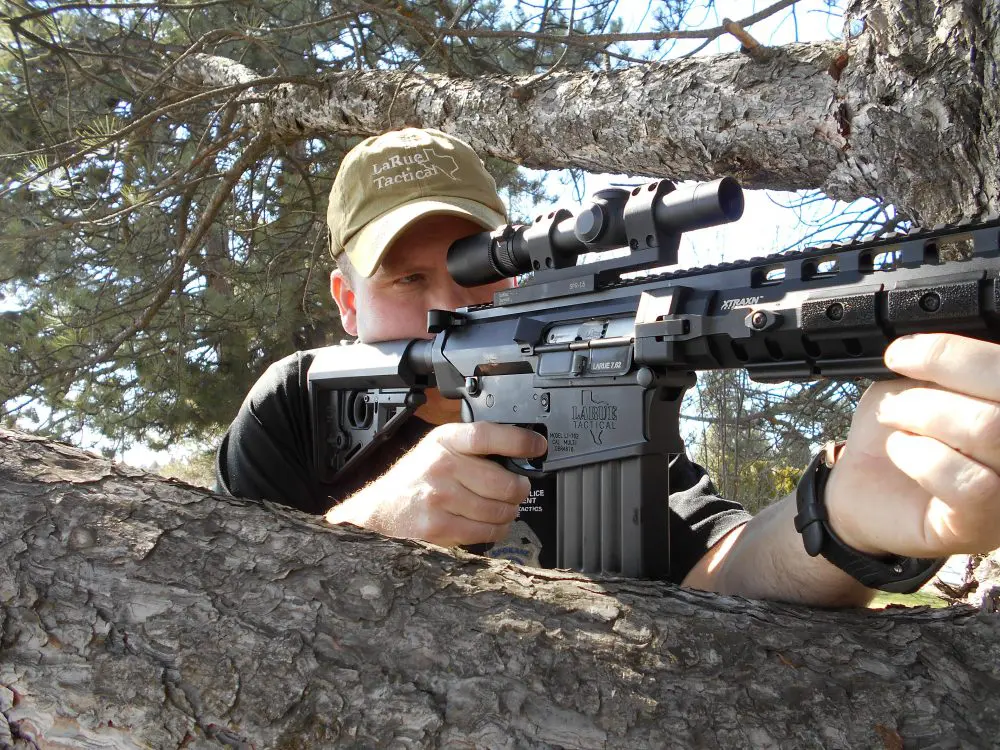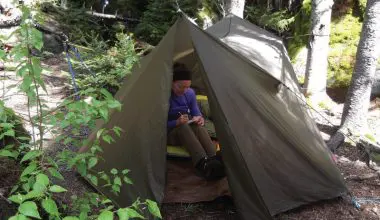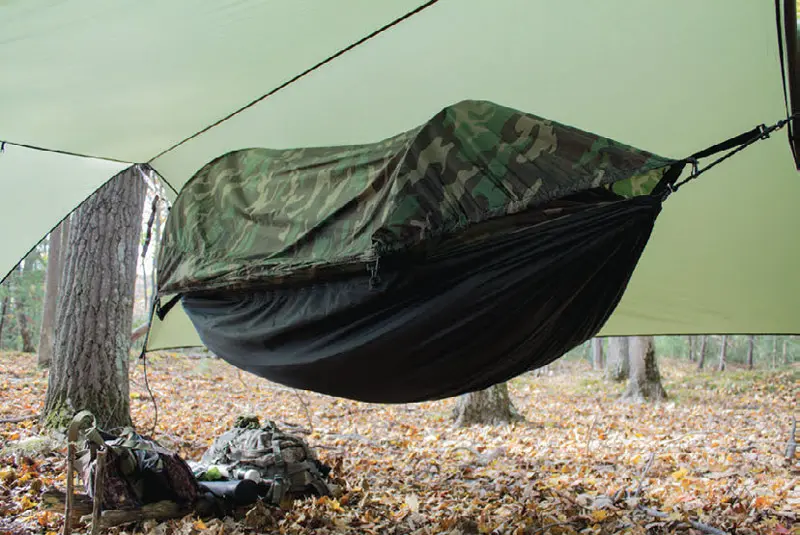
Being a hammock camper and having slung my bear taco in places from the Amazon Jungle to the Rocky Mountains and the woods of upper Michigan, I can’t picture backpacking without one. And therein lies the problem— any time I head out, I have the nagging worry there may be insufficient trees to sustain a hammock.
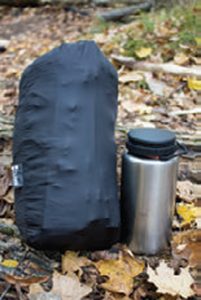
Case in point: my brother and a friend frequently go on rafting trips down the Colorado River. I have been planning to make a trip with them, but my brother has informed me there are from zero to very few trees at some of their stops, so my hammock is not going to work for me. The Clark Jungle Hammock MARK2, a ground tent/ hammock hybrid, offers a good solution to this problem.
One of the things I really love about hammocks is their ease of setup. Depending on how sophisticated the system is, I can have a good hammock up in five to ten minutes. For that reason, setup is something I focus on when reviewing a suspended sleeping system.
Table of Contents
SUSPENDED SETUP
Due to the fact that the MARK2 has poles, for the ground tent setup, there is a little more work than for a typical suspended sleeping system, but it’s negligible. There are only two collapsible poles and they slide nicely into their sleeves. Make sure you pay attention to which sleeve you put each pole into— there is a longer pole and a shorter pole for the two different ends.
Due to the pole setup, I felt it hung a little weirdly and had a bit of a list to it, but once I was in it, it righted itself pretty well. The rainfly was very slick and hard to manage at first, but once it was in place, it encapsulated the entire hammock like a waterproof cocoon.
GROUND TENT SETUP
The ground tent setup was even easier than the suspended setup. All I had to do was put the poles in, stake down one end of the hammock, pull the other end tight and stake it down. Just by pulling the other end tight, the poles raised up, creating a spacious interior.
The whole thing can be set up in about three minutes and is as comfortable as any ground tent. Being a hammock, it’s a small, one-person ground tent, so there’s not much room for your gear, but it is a very effective shelter. The thick sealed floor/bed adds to the water resistance of the MARK2.
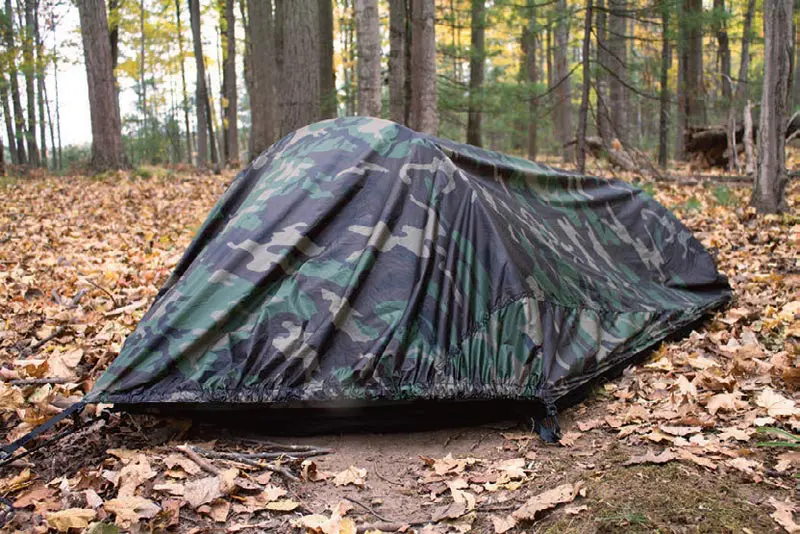
COMFORT
All in all, it was a comfortable sleeping system. The poles made it feel very roomy and kept the sidewalls off me while I slept. The sealant used to waterproof the bed prevented slipping and helped keep my sleeping bag and pad in place, which was helpful, but it had its downside. If my bag and pad did move at all, it was very difficult to get them back into place under me and almost required getting out to reposition them.
I like the fact that you can open the entire top and use it as an open hammock, but it did not allow for one side of the netting/WeatherShield to be open on its own. When opening one side alone, the netting/WeatherShield kept falling back into the hammock and getting in my way. I would have preferred the ability to open one side at a time so I could situate my bedding and gear without opening the whole hammock. I think some sort of tieback would be sufficient for that.
The MARK2 is not a cold-weather solution, so if you’re going out late in the season, make sure to have a good sleeping bag and pad to keep under you. Our first night out, the temp got down to 29° and it was 44° in my hammock. My son was using my Clark North American Four-Season and he was very warm. But with my modular sleeping bag system and sleeping pad tucked in between two of the layers, I was still warm. Without them it would have been a cold night.
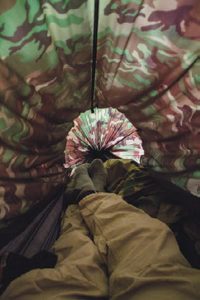
FOOTPRINT
I was quite happy with the footprint in my pack. My concerns about the MARK2’s size and weight with the included structural poles were alleviated. It wasn’t too large, with a packed size of only 14×6 inches and weight of just over three pounds. It was not overly cumbersome for the options it provided.
FEATURES
As far as features go, the MARK2 is a fairly simple suspended sleeping system. I do like that it includes a loop at the head, stitched directly in-line with the suspension rope, for resituating yourself during the night.
Also, I always wear an ABC (altimeter, barometer, compass) watch while camping and like to be able to hang it above my head while sleeping so I can monitor the internal hammock temperature and the barometer to make sure nothing nasty is heading my way. The MARK2 provides a small loop overhead that lets me attach a small clip to hang my watch from.
That loop, combined with the small ridge loop at the other end, permits you to rig an internal ridgeline between the two for hanging small essentials like a pouch or light.
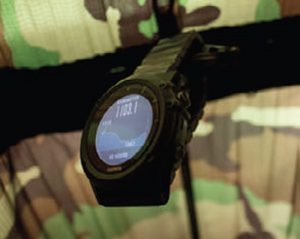
I would have liked a couple of small interior pockets somewhere toward the head for holding items like glasses and a flashlight, and a small external pocket for storing the hammock’s and my sleeping bag’s stuff sacks to make it more self-contained.
Due to the design of the rainfly, you may want to bring an extra tarp for use as an awning for your gear and a place to hang out during inclement weather.
CONCLUSION
Overall, for its simplicity and barebones features, the Clark MARK2 is a good hammock. Even though it doesn’t have some of the features I like to see in a suspended sleeping system, Clark did design features that let you expand on it to include extras of your choosing.
The fact that it can be set up as a ground tent is what really wins me over with the MARK2, because it takes the worry out of backpacking in various regions.
I will probably opt for my Clark North American any time after mid-October, but will get a lot of use out of the MARK2 during the spring and summer months. And with a few modifications and additions, the MARK2 has the potential to be the hammock I really appreciate on any given trip.
